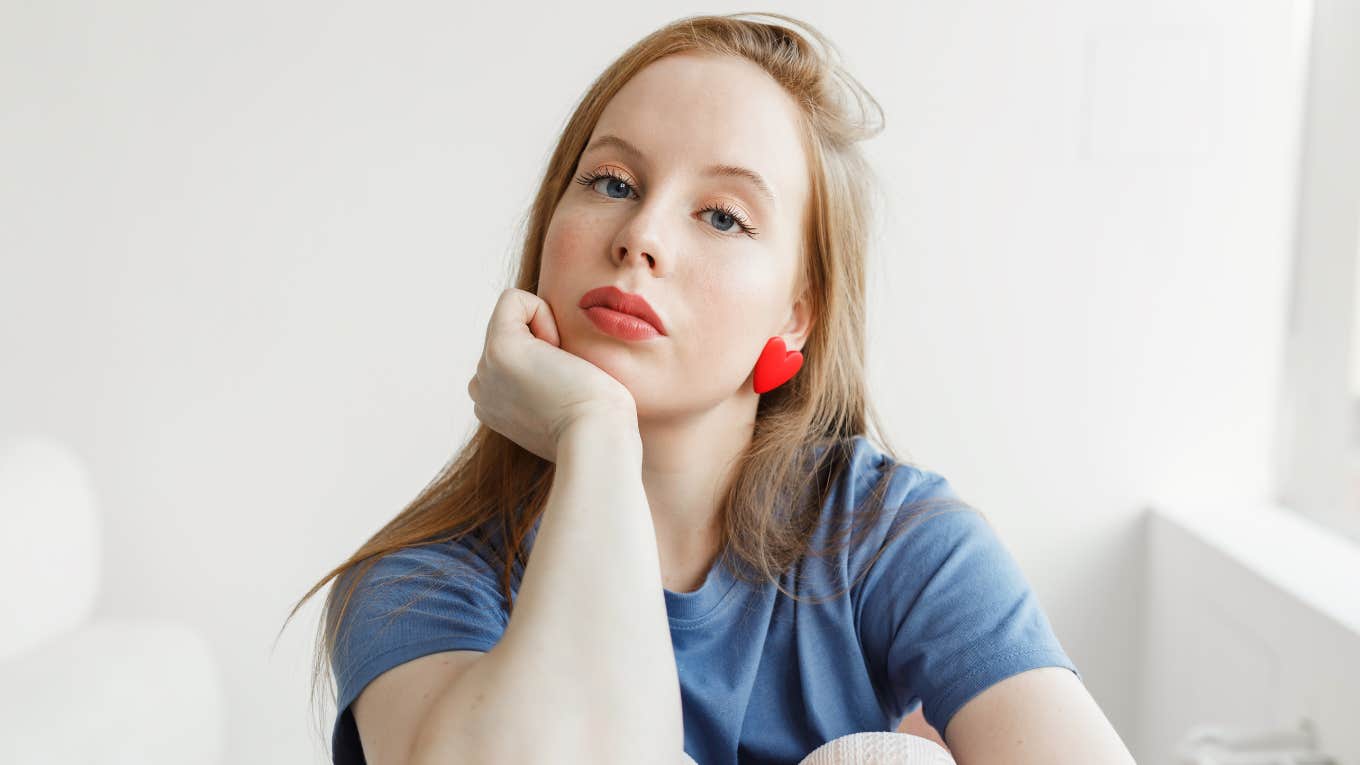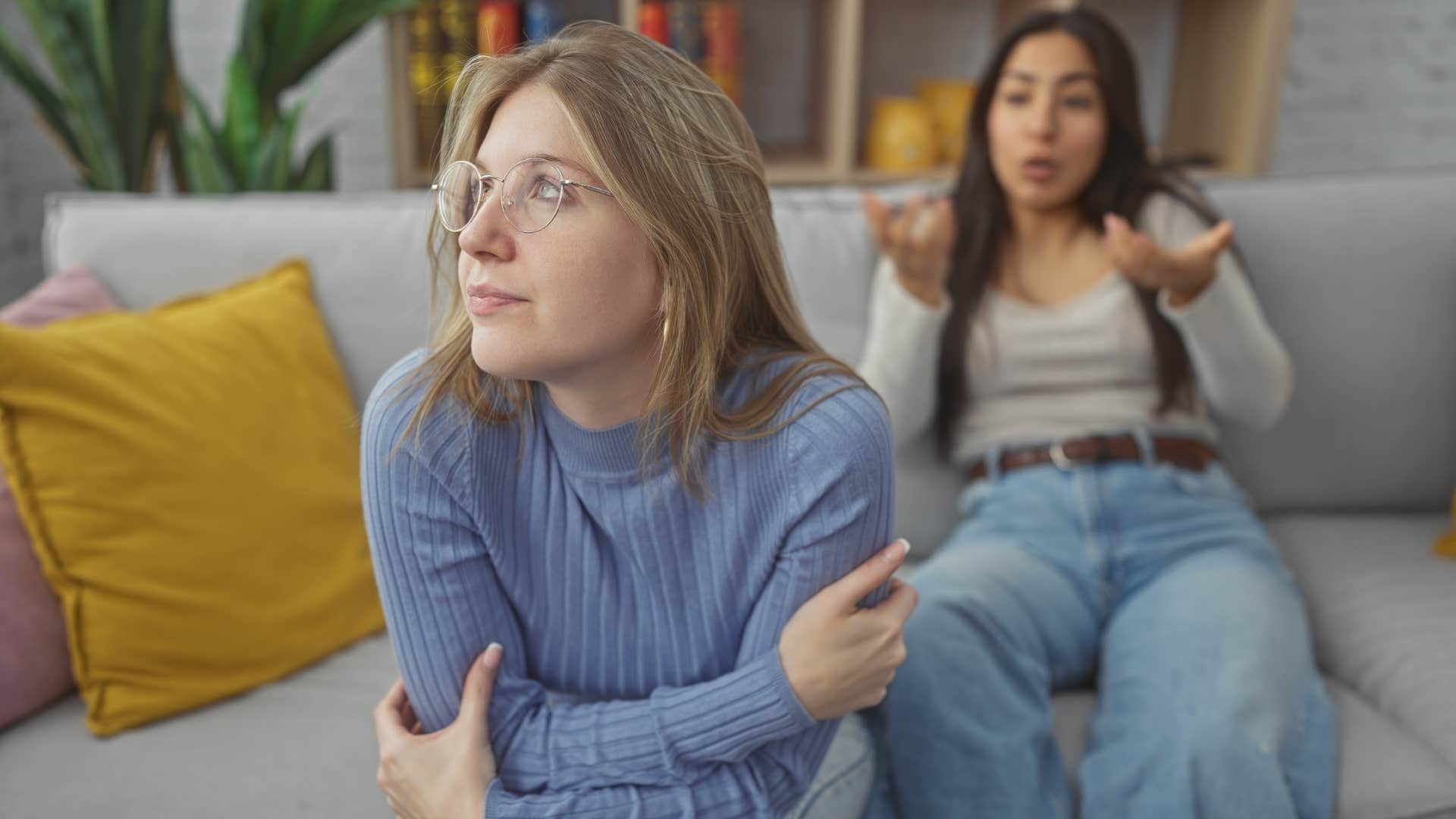11 Signs Your Privacy Is So High That Other People Won't See You Unless You Decide To Be Seen
Some people protect their privacy a little too closely.
 shurkin_son | Shutterstock
shurkin_son | Shutterstock We live in a world where it feels like everything is public. People are constantly sharing their lives on social media and gossiping about others with their friends. Nothing is personal anymore, and if you're one of the rare people who likes to keep things private, you’re looked at like you’re a unicorn. Ours is a world of chronic over-sharers, and it seems like there’s no room for people living quiet lives.
There are many advantages to living a private life, though. According to a research proposal from the University of Phoenix, “Privacy allows individuals to control their personal narratives, reducing stress and anxiety while fostering a sense of autonomy.” While there are people willing to reveal everything about themselves, there are signs your privacy is so high that other people won’t see you unless you decide to be seen. Because, sometimes, being too private can be detrimental.
Here are 11 signs your privacy is so high that other people won’t see you unless you decide to be seen
1. You never share about your life
 Krakenimages.com | Shutterstock
Krakenimages.com | Shutterstock
If you keep your privacy high, you probably rarely share anything personal with others. Whether it's friends, family, or acquaintances, you much prefer surface-level small talk than anything deeper.
The weather and current news are much safer topics than anything personal that would reveal anything about who you really are. You like to be a bit of a chameleon and not be perceived a certain way by others, so you hold it all in.
This probably sounds horrible to some people. They can't imagine not sharing all of their highs and lows with their nearest and dearest, and maybe even a few random people who are in the right place at the right time. But for you, sharing and getting personal is the worst thing imaginable.
Whatever your opinion may be on keeping private things private, self-help coach Natasha Adamo thinks it's a good idea. "A private life is a happy life because it enriches the most important relationship that you will ever have — the one you have with yourself. It also translates to the world that because you have trust within, you're a trustworthy person," she said. Some people might be chatter boxes, but keeping things private definitely has its benefits.
2. You don’t have a lot of friends
 BearFotos | Shutterstock
BearFotos | Shutterstock
One of the big signs your privacy is so high that other people won't see you unless you decide to be seen is your lack of friends. Being close to another person and sharing your life with them is kind of the definition of friendship, so not wanting to do that means you probably won't have a large circle around you.
Your private nature means that you naturally have fewer close people in your life. You carefully vet everyone and make sure you're comfortable with them before letting them get close. Not having people in your life that you can count on isn't necessarily the best thing, though.
As the Mayo Clinic said, "Adults with strong social connections have a lower risk of many health problems. That includes depression, high blood pressure, and an unhealthy weight. In fact, studies have found that older adults who have close friends and healthy social supports are likely to live longer than do their peers who have fewer friends."
It's okay to want to keep your group of friends small and tight knit. Quality over quantity, right? But make sure you do have some friends. Not having any close connections could be detrimental to your health. Then again, if you don't want to be seen, that might not really concern you.
3. Nobody knows that you have problems
 PeopleImages | Shutterstock
PeopleImages | Shutterstock
Realistically, everyone has problems, so people know you must face challenges at some point. But if you're super private, you might not let any sign of those problems show. And, as people grapple with their own issues, it's easy for them to let things that are out of sight slip out of mind.
If you seem okay, there's a good chance they'll assume you are, and think you don't have any problems that you could use some help with. One downside of living life this way is that people might start to believe your life is perfect. And, the truth is, they're really preconditioned to believe that.
Clinical psychologist Barbara Greenberg stated, "It is because it is part of the human condition to compare ourselves to others who we know from many areas of life including school, work, and our communities and who seem to be similar to us in so many ways except in our perception that these others have perfect lives."
Of course, it's not your fault if someone else assumes your life is perfect and gets upset about their own life because of it. And it's likely that if you're keeping all of your problems hidden, your life isn't a walk in the park at all.
Having issues to deal with is bad enough, but dealing with them in total secrecy just adds another layer of difficulty. Nevertheless, if your privacy is high, people won't know you have problems unless you want them to.
4. You don’t invite people over
 fast-stock | Shutterstock
fast-stock | Shutterstock
Someone with a high level of privacy is not going to want to invite people over to their house. And, naturally, there's nothing they'll hate more than visitors who show up unannounced. If this sounds familiar, it's another of the signs your privacy is so high that other people won't see you unless you decide to be seen.
You probably don't trust a very large group of people that you would want in your home anyway, so it doesn't feel like that much of a loss. Still, not inviting people over could be another sign that you have few friends, which can be bad for your well-being.
"It turns out that healthy relationships actually contribute to good physical health," said clinical psychologist Arlin Cuncic. "Having a close circle of friends can decrease your risk of health problems like diabetes, heart attack, and stroke. Having strong social ties can also decrease feelings of loneliness, which evidence shows can take a toll on your longevity."
Not having people you feel close to is typically pretty bad for your health, but some people aren't willing to sacrifice their peace for what may prove to be better health in the long-term. It may just not be worth it to you to invite people over, no matter what benefits it may have.
Your privacy is your most prized asset, so you obviously want to protect it at all costs. And if you're extremely private, there might not be a ton of people to choose from to invite over anyway.
5. You don’t socialize with your co-workers
 PeopleImages | Shutterstock
PeopleImages | Shutterstock
To be clear, no one is required to socialize with their co-workers. And some people would probably argue that it's better not to because it's hard to know who you can really trust at work.
But everyone's bound to go around the office and share what they're doing over the weekend at some point. You don't participate, though, because you have no desire to be friendly with your co-workers. Doing so would put your privacy in jeopardy.
Heidi Godman, the executive editor of the Harvard Health Letter, said, "Many studies suggest that having strong social networks (friends who support or help you) or taking part in social activities is associated with a reduced risk of developing cognitive impairment and dementia." She added that socializing can boost your longevity and mood and decrease stress.
If you don't socialize with your co-workers, you may be robbing yourself of important health benefits. Also, by feeling like you can't trust your co-workers, you may come off as the one who's untrustworthy.
Still, being best friends with the people you work with is not a requirement, and if you really care about your privacy, it may make sense to not let them get too close. You can't really maintain a personal life if it mixes with your professional life.
6. Nobody knows about your success
 ViDI Studio | Shutterstock
ViDI Studio | Shutterstock
If your privacy is so high that other people won't see you unless you decide to be seen, you'll probably seem like the most humble person in the world. You're not going around bragging about your success. In fact, forget bragging — you're not talking about your achievements at all.
Just like no one will be aware of your problems, no one will be aware of your success either. You stay tight-lipped about everything, the good and the bad.
Not telling anyone about your hopes for the future could set you back some, though. A study published in the Journal of Applied Psychology found that reaching goals actually becomes easier when you share them with someone who is considered superior to you.
Study author Howard Klein, professor of management and human resources at Ohio State University, added, "Contrary to what you may have heard, in most cases you get more benefit from sharing your goal than if you don't — as long as you share it with someone whose opinion you value."
Still, that doesn't mean you're not going to be successful at all if you don't share your goals with others. Plenty of people choose to keep their dreams and aspirations private. There's nothing wrong with that; it's just a matter of personal preference. And people who keep their privacy high are probably not going to want to share those things at all.
7. You say you’re fine
 Kues | Shutterstock
Kues | Shutterstock
One of the glaring signs your privacy is so high that other people won't see you unless you decide to be seen is saying you're fine even when you're not. This is kind of like not sharing your problems with anyone, but it really goes beyond that.
In this situation, someone would be specifically asking you if you're doing okay, and you would be lying to them to cover up the truth that you're not. There's no judgment here if that's you. It's just the reality of the situation.
Social worker Sharon Martin explained, "We want others to think everything is working out great for us because we're afraid of the shame, embarrassment, and judgment that might come if people knew the truth (that we're struggling, our lives are unmanageable, our loved ones are troubled, that we're not perfect, etc.)."
Wherever your fear of admitting how you're really doing may be coming from, there's nothing wrong with keeping it to yourself. You have a right to be private if you want to be. Sometimes people can tell when you're not fine, though, even if you say otherwise. Keep in mind that others' intuition may be stronger than your words.
8. You don’t over-share online
 Antonio Guillem | Shutterstock
Antonio Guillem | Shutterstock
A lot of people over-share way too much online. They treat social media like it's their digital diary, and they really let it all out. This can be uncomfortable both for the people who have to see the over-sharing, and for the person who does it in the first place.
But that's not you. Part of keeping personal things personal means never over-sharing online. No huge photo dumps and long captions for you. And, really, that's a good thing.
Financial writer Evelyn Waugh said, "Always think carefully before posting something online. Information that may seem innocent enough — like your birth year or high school mascot — could actually be sensitive data that hackers can use to bypass your account security or even impersonate you."
Waugh used an example of posting about an upcoming vacation as something that's a red flag. Then, criminals know exactly when your house will be unoccupied. Unlike some aspects of being private, like not having a lot of friendships, that can actually harm your health, avoiding over-sharing on social media is something that's good for you — and, really, everyone.
9. You’re never vulnerable
 BongkarnGraphic | Shutterstock
BongkarnGraphic | Shutterstock
Another sign that your privacy is high is that you lack vulnerability. You prefer to keep conversations surface-level and never dive too deep into how you're feeling or what you're thinking.
Vulnerability can be scary, so it's pretty easy for people to avoid it even if they aren't trying to protect their privacy. Unfortunately, holding back on vulnerability doesn't help you any.
"Opening up to others can be difficult, but you might have difficulty forming and maintaining relationships if you remain closed off," licensed professional counselor Marissa Moore noted. "Some level of vulnerability is required to have healthy relationships."
Vulnerability is a tricky thing. It can feel very uncomfortable, which can dissuade people from pursuing it. It's also hard to be vulnerable and keep walls up to protect your privacy. However, if you're not vulnerable, you'll never let anyone in.
Avoiding vulnerability can seriously harm your relationships. Maybe you think you don't need any because you're private, but everyone needs someone in their life.
10. You have too many boundaries
 Cast Of Thousands | Shutterstock
Cast Of Thousands | Shutterstock
"Boundary" is a buzzword right now, and everyone wants to make sure they're building them up. However, you could go overboard and create too many boundaries. If you're really trying to be very private, you may shut people out and call it creating boundaries, or put up walls to keep people from seeing the real you. This probably feels pretty comfortable and safe, but it doesn't help you out any.
Clinical psychologist Leah Katz shared her own boundary "rule of thumb," explaining, "When the boundary reflects overly rigid thinking and behavior, is poorly communicated (or not communicated at all), leaves others feeling in the dark or confused, you may want to evaluate both the boundary as well as the mode in which it was communicated."
Boundaries are meant to protect us from being used and hurt by other people, but sometimes we go too far. Having a lot of boundaries in place can feel safe, but it can also cut you off from other people if you're implementing too many of them or doing so incorrectly. This is one way you could keep your privacy level high, but it's one you have to be careful with.
11. You could disappear
 antoniodiaz | Shutterstock
antoniodiaz | Shutterstock
Have you ever seen a true crime show where someone went missing and no one reported it at first because it was normal for them to be a little out of touch with everyone in their life? This doesn't mean you could disappear off the face of the earth and no one would know or care, but if you feel like you could go off the grid pretty easily, you might have taken your privacy to an extreme.
This also goes for issues on a much smaller scale, like being able to slip out of a party or event without anyone noticing. It's a sign that your privacy is high — maybe too high. You want to ensure you're always safe and people know how to keep track of you in a healthy way.
If you want to go off the grid, that's totally fine, but if you think something serious could happen without anyone noticing, it might be time to reevaluate how close to the vest you're keeping your private details.
Mary-Faith Martinez is a writer with a bachelor's degree in English and Journalism who covers news, psychology, lifestyle, and human interest topics.

